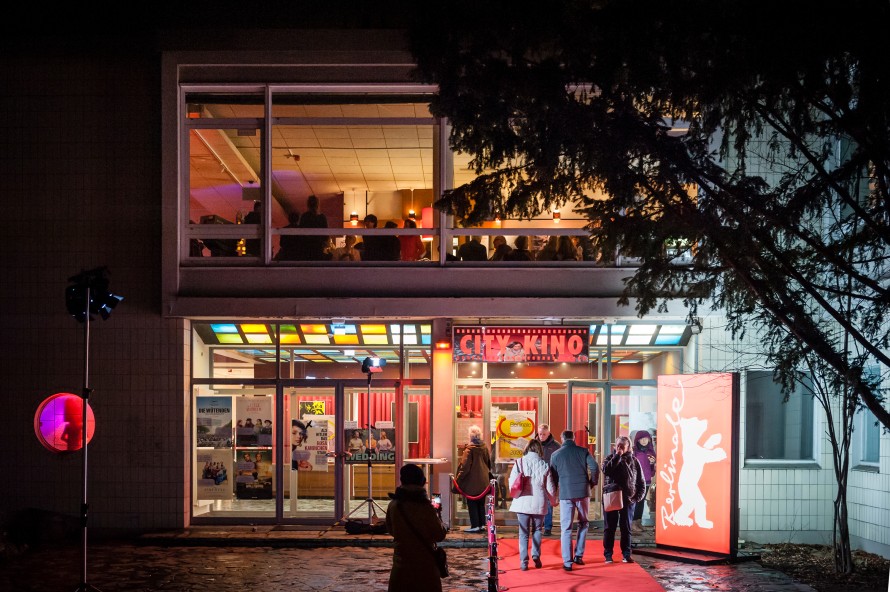Additional Information
Jan 22, 2024
Berlinale Goes Kiez 2024: Celebrating Neighbourhood Cinemas

Berlinale Goes Kiez in the City Kino Wedding
Hardly any other city has as many arthouse cinemas as Berlin does. In their diversity, they provide a unique bounty of film programming and a wide range of events treating film-cultural and socio-political subject matter. The individual cinemas are also as different from one another as their programmes are. As spaces for community and discourse, they not only serve as special meeting places for film lovers – they also make a significant contribution to a better understanding and empathetic coexistence.
For this reason, Berlinale Goes Kiez is once again directing attention to local cinemas during the upcoming Berlinale. Together with its audience, the festival would like to celebrate film and the cinema in particular, while also paying tribute to the valuable work that arthouse theatres perform. True to the established formula, from February 17 to 23 the little red carpet will be making its way from neighbourhood to neighbourhood, and even to the outskirts of the city.
The Seven Cinemas of Berlinale Goes Kiez 2024
The honour of opening Berlinale Goes Kiez this year goes to City Kino Wedding, which, following a change in management just over a year ago, is run with great enthusiasm by Andrea Stosiek (also of Sputnik Kino). With its lavish 1960s architecture, the cinema has made a name for itself in particular as a host of numerous festivals, as well as through a variety of special events.
Neue Kammerspiele Kleinmachnow is among the region’s classic spots for local cinema due to the special bond it shares with its audience. This storied institution is not only a cinema that places its emphasis on European arthouse fare and exhibits a strong love for children’s cinema – it also provides a wide range of cultural programming, including concerts, theatre performances and even music courses for large and small.
After being uprooted by real-estate development plans, Kino Zukunft has found a new home. Thanks to a mini-miracle, in mid-December 2023 it was able to re-open just under five minutes away from the old location, between Treptower Park and Ostkreuz, at Alt-Stralau 68. The movie theatre, with its 64 seats, screens three films a day, while the piano salon hosts “Wednesday Jazz” among other highlights, and the bar boasts self-brewed beer and a generous outdoor patio.
The history of Kino Toni extends back to the year 1920. It has been remodelled multiple times since then and management has also changed a number of times. As the last “East Berlin” cinema in private hands, it was taken over in 1979 by the district agency and put up for sale by the Treuhand trust in the scope of re-unification. In 1992, this “apartment house with a movie theatre” was purchased by director Michael Verhoeven, who added a second screening room. Since its sale to the Berlin-based film distributor Neue Visionen in 2018, Iris Praefke and Wulf Sörgel (both also of Kino Moviemento and Kino Central) have been the current operators.
Babylon Kreuzberg has been part of the Yorck-Kino group since 1986. Built atop ruins in 1955, it attracted many guests from the Eastern part of the city until the Wall was erected, who could enjoy “Western films” here. In the 1970s, it featured Turkish programming. Following a full renovation in the 1980s, it has gained notoriety for its spiral-shaped starry sky ceiling in the large cinema room and for exclusively showing original-version films.
Sinema Transtopia is Berlin’s youngest cinema. Operating outside the realm of regular theatre releases, it presents a daily-changing curated programme of films and discussions devoted to transnational, (post-)migrant and post-colonial perspectives. After two years in the Haus der Statistik, where it was launched as a cinema experiment in the scope of an urban policy model project, in January 2023 Sinema Transtopia found its own permanent location in Wedding, thus adding a consistent discursive space to Berlin’s cinema landscape.
Cosima Filmtheater opened in 1935 as the ninth cinema in Friedenau, built in a style common at the time – inside a residential building and featuring an elongated screening room. From the 1960s, the cinema was run for many decades by the same theatre director. In 2022, Karlheinz Opitz (also of Eva Lichtspiele) took over and subsequently undertook extensive renovations. In July 2023, the cinema re-opened in new splendour and now regularly shows selected film classics and “Berlin film rarities” alongside current arthouse fare.
1. Saturday, February 17 City Kino Wedding
2. Sunday, February 18 Neue Kammerspiele Kleinmachnow
3. Monday, February 19 Kino Zukunft (Friedrichshain)
4. Tuesday, February 20 Kino Toni (Weißensee)
5. Wednesday, February 21 Babylon Kreuzberg
6. Thursday, February 22 Sinema Transtopia (Wedding)
7. Friday, February 23 Cosima Filmtheater (Friedenau)
The operators will be presenting unique aspects of each venue in brief video portraits, providing insights into everyday life in the cinema, telling personal stories from their establishments and inviting any and all interested parties to come out and discover their cinemas.
Special Event at JVA-Plötzensee Correctional Facility
In 2018, the special series Berlinale Goes Kiez was expanded to include the presentation of a Berlinale film in a Berlin prison. Following the positive experiences of the past years, this cooperation will also be continued in 2024. This joint effort allows Berlinale Goes Kiez in a special manner to fulfil its mission of deconstructing barriers and enabling cultural participation.
Details on the full programme of Berlinale Goes Kiez as well as admission requirements for the special event at the correctional facility will be announced in a further press release on February 6.
Berlinale Goes Kiez is made possible with the generous support of Medienboard Berlin-Brandenburg.
Press Office
January 22, 2024